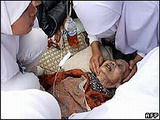|
|
TODAY.AZ / Society
BBC: "More than 3,000 dead in Indonesian quake" - UPDATED
27 May 2006 [13:49] - TODAY.AZ

The quake, measuring 6.2, flattened buildings in a densely-populated area near the city of Yogyakarta on the southern coast of Java.
Witnesses said people fled as their homes collapsed around them, after the quake struck early in the morning.
Electricity and communications across the city were also down, police said.
At least 2,900 people have been injured, and many more are still thought to be trapped under rubble and collapsed buildings.
Indonesian President Susilo Bambang Yudhoyono has ordered the military to help evacuate victims, and plans to visit the area later on Saturday.
Yogyakarta's airport was closed. Local media said the runway had cracked and part of a roof had caved in.
Yogyakarta is near the Mount Merapi volcano, which threatened to erupt earlier this month, forcing thousands of people to be evacuated.
The earthquake is not thought to be caused by the volcano, but there are reports of heightened activity in its vicinity.
Officials said that although the area affected was coastal there was no tsunami resulting from the quake.
The quake hit at 0554 local time (2253 GMT Friday), around 25km (15 miles) south of the city of Yogyakarta, the US Geological Survey (USGS) said.
Yogyakarta, Indonesia's ancient royal capital and one of its biggest cities, is about 440km (275 miles) south-east of the capital, Jakarta.
"The earthquake was felt to be massive - larger than the locals here say they've felt in their lives," said Brook Weisman-Ross, regional disaster co-ordinator for Plan International children's charity in Java.
"I was shaken from my bed... As furniture was falling, concrete chunks started falling from my hotel room as people were running out in panic in their bedclothes," he told the BBC.
He said there was extensive damage across the city and that many of the smaller, older houses had collapsed.
But a wide swathe south of the city, in the Bantul and Kulonprogo regions, appears to be the worst hit.
The BBC's Orlando Guzman in Yogyakarta says every other house on the main road south of Yogyakarta is either flattened or seriously damaged.
The death toll rose steadily as hospitals around Yogyakarta reported a growing number of fatalities.
Local radio said there were not enough doctors to cope with the numbers of injured.
People were ferried to hospital in lorries and buses, or made the journey on foot, because of a shortage of ambulances.
Aftershocks have forced medical staff to move injured patients outside.
Our correspondent says people here, who have been leaving in fear of a volcanic eruption for weeks, are very much still on edge. Many are still afraid to go back to their houses.
Mosques, churches and hospitals have been housing people who have fled their homes.
"We're still afraid. We don't want to go home," said Hendra, one of hundreds of people who took refuge at Yogyakarta's Marganingsih Catholic Church.
Indonesia is in a zone known as the Pacific "ring of fire", which is prone to earthquakes and volcanic activity.
In December 2004, a huge earthquake off Indonesia's coast killed hundreds of thousands of people across the Indian Ocean by triggering a tsunami.
/www.bbc.co.uk/
URL: http://www.today.az/news/society/26634.html
 Print version
Print version
Connect with us. Get latest news and updates.
See Also
- 24 January 2025 [14:09]
Update on injured passengers from AZAL plane crash - 23 January 2025 [10:22]
TABIB reports 24 million medical applications in 2024, marking significant growth - 22 January 2025 [10:43]
Design work for Alat-Astara railway line to begin 2025 - 21 January 2025 [18:40]
Planet parade to be visible in night sky - 20 January 2025 [10:49]
Earthquake recorded in Caspian Sea - 20 January 2025 [00:00]
From tragedy to triumph: Heroism of Azerbaijani martyrs on 20 January - 19 January 2025 [22:01]
Azerbaijan's Foreign Ministry issues statement on January 20 - National Day of Mourning - 19 January 2025 [18:00]
Baku metro operating hours to be rescheduled for 20 January - 19 January 2025 [16:47]
Baku offers alternative routes for traffic on National Day of Mourning - 18 January 2025 [11:35]
Some 1,268 apartments built in 2nd residential neighborhood in Agdam city
Most Popular
 Panic in Armenia: Does Paris want to put up with Baku?
Panic in Armenia: Does Paris want to put up with Baku?
 Azerbaijan prevents smuggling of narcotics from Iran
Azerbaijan prevents smuggling of narcotics from Iran
 Multi-vector approach from Pashinyan: Give as many as you can!
Multi-vector approach from Pashinyan: Give as many as you can!
 United States invests $500 billion in AI
United States invests $500 billion in AI
 Ankara, Bratislava forge stronger ties with new strategic partnership
Ankara, Bratislava forge stronger ties with new strategic partnership
 Azerbaijan holds hybrid meeting on green energy strategy implementation
Azerbaijan holds hybrid meeting on green energy strategy implementation
 US' new Secretary of State reaffirms Türkiye ties and discusses regional issues with Fidan
US' new Secretary of State reaffirms Türkiye ties and discusses regional issues with Fidan
